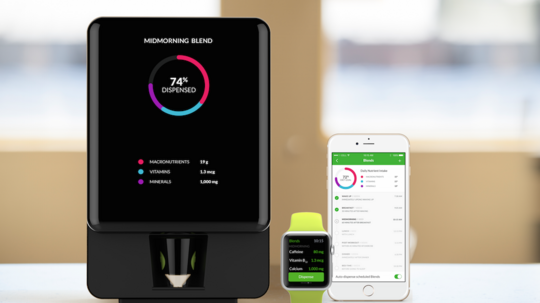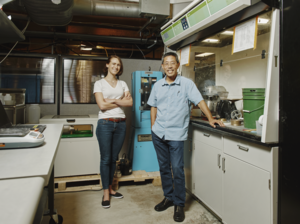
Crowdfunding is entering the mainstream with little oversight. Platforms like Kickstarter and Indiegogo have given entrepreneurs a new avenue for bringing products to market. But sometimes, campaign creators make promises they don't keep, and the crowdfunding sites say their hands are tied.
Last month, BostInno reported on Nourish, a personalized nutrition system hitting Indiegogo. Now, a little digging reveals that the company behind the campaign (FitNatic) is linked to a string of crowdfunding efforts that have yet to follow through on shipping products. FitNatic founders Aldo Beqiraj, Jesse Caruso and Stephen Lamarre are behind the Streetsmart Brand (founded 2013). They are also the brains behind at least seven other Indiegogo and Kickstarter campaigns for high-tech devices, besides FitNatic, dating back to January, 2014. These campaigns have brought in more than $294,000.
None, according to angry backers, has delivered the promised gadgets. One project, "SkyTag," a "drone-tracked bluetooth tag" for lost-item recovery, has refunded money to backers, Beqiraj said, though its Indiegogo page hasn't been updated in 10 months, since before the project was funded.
On Friday, Lamarre posted an update to Indiegogo backers announcing that the FitNatic campaign was being pushed off, and all backers would be refunded. "We conducted a thorough investigation to reveal the facts and decipher all of the lies," he wrote. "After much discovery, discussion, and deliberation we’ve decided to sever ties with former team members Aldo Beqiraj and Jesse Caruso."
Jason Enos, CEO of Empire Prototype, says his company was working with FitNatic, helping them through the design and prototyping process to bring their product to life. As of now, the team owes Empire more than $30,000 for its services, he said. Enos was in constant contact with Beqiraj, who "ran the show," he said. Then, about a week and a half ago (right around when the Reddit thread hit), all communication was dropped.
"I kept saying—there's no way you can deliver this product in the timeline you've got.
"It was trouble from the beginning," Enos told BostInno in a phone interview. "I kept saying—there's no way you can deliver this product in the timeline you've got. The prototype is all smoke and mirrors, really. There's so much that needs to be figured out for this to actually work." He added: "It's a shame, it was a good idea. But these guys didn't know how to deliver."
The track record
Andrew Ambrosino was a part-time developer for Nourish by FitNatic and was chief product officer for Bringr (formerly Bringrr), another Kickstarter project by Beqiraj, Caruso and Lamarre, promoting a tracking device for everyday items. According to Ambrosino, the team is good at making prototypes. Unfortunately, he says, they don't have the skills to actually execute on their original ideas.
“They're thrown together just for show,” he explained. “The Bringr ‘app’ video was just a series of photoshop files that he cycled through … In order to produce the prototypes and marketing material, they just take out loans and credit cards like you wouldn't believe. It seems like a house of cards to me but they land on their feet because they're good.”
Ambrosino added that to his knowledge, the team has intended to deliver on all projects when they put them on the crowdfunding sites. However, he says they "lose steam and 'forget' about the project." Ambrosino paints a picture of the company culture, including nights out at the club, penthouse apartments and team trips to Bali--which, according to Beqiraj's Facebook feed, is where the FitNatic team traveled to launch Nourish.
Aldo Beqiraj responded to requests for an interview after this article was published. The trip to Bali was for Break, an annual startup conference, he said. "We spent about $150,00 into this project. We’re not trying to scam people," he said of Nourish. "There’s no profits in any of this. It’s an array of bad luck."
Before Nourish, Bringr raised funding successfully in two campaigns: a $76,561 Kickstarter in February 2014 and again with $74,441 on Indiegogo in May 2014. Deliverables included tags to track everyday items, a mobile app with a compass finder and a car charger that alerts a driver who gets in the car without important personal items. In October 2014, Asheem Aggarwal took over the project from Beqiraj, under the title of CEO. Beqiraj says his team quit after Aggarwal went behind his back to take control.
A recent update shows photos from a visit to the manufacturing facility in Shenzhen, China, with Aggarwal promising delivery of the products by October. But backers are still concerned that they have yet to see proof of any product development. Comments (564 of them) range from rage to regret.
“I wish now that I'd been part of the mass exodus of backers in the final days of the project,” one wrote.
Reached by phone, Aggarwal said the Bringr project started in 2010. Founder Jim Logan, serial entrepreneur and holder of the "podcast patent," brought on Beqiraj and his associates to manage a crowdfunding campaign.
From the beginning, Beqiraj's expectations were unrealistic, Aggarwal said. "I’m like, 'Guy, you’re not going to launch this product. You’re driving it into the ground,'" Aggarwal said. He compared Bringr to Tile and Trackr, two similar crowdfunded tracking devices: "They raised millions and they were still late," Aggarwal said.
Now, that money is spent and the company has little to show for it other than a thread of angry public comments, Aggarwal said.
Jin Kim, who three weeks ago started a Reddit thread regarding the FitNatic team, made a $25 pledge to the Bringr Kickstarter.
Kim said he had nearly forgotten about Bringr altogether until about a week ago, when he received an email about the Nourish project, apparently sent to people on the Bringr project mailing list. "That's when I started digging around," Kim told BostInno.
After starting the Reddit thread, it was obvious that there were plenty of other frustrated backers as well.
“Every one of the campaigns above have been filled with promises about fancy new technology that appeals to the concept of an ‘Internet of Everything’ and seems just plausible enough to work, if someone actually took the time to engineer it,” Kim wrote.
After Bringr came JookBox, a WiFi and app-enabled speaker—funded successfully on Kickstarter November 2014 with $40,542, and then again on Indiegogo February 2015 for $17,321. Backers’ comments on the crowdfunding page express confusion over not having received the product, which was originally scheduled to ship February 2015.
Michael Condon, co-founder of Jookbox maker BSX Audio, said the father-and-son company also hired Caruso and Beqiraj to run its crowdfunding campaign. BSX fired the two entrepreneurs at CES in January, he said. The company has refunded some frustrated backers and plans to have 400 units of the $169 speaker ready to ship in 45 to 60 days.
“We’re killing ourselves trying to put these things together," he said.
Condon said while they were working together, he helped Beqiraj with a concurrent project, SkyTag, including an appearance in this promotional video. SkyTag's Indiegogo campaign for a drone-based system for finding lost personal items, came shortly after Jookbox closed on Kickstarter and successfully raised $37,626.
Beqiraj says the project was "premature," under existing drone regulations. He said he has refunded Indiegogo backers, though a few were still clamoring for their drone-tracked tags as recently as two weeks ago.
Smart Wallet was another Beqiraj-Caruso-Lamarre production that ran multiple crowdfunding campaigns on different platforms. A leather wallet designed with built-in Bluetooth BLE and GPS tracker, Smart Wallet's Kickstarter was funded successfully in September 2014 with $36,237, as was the Indiegogo in January with $11,568. Mid-August the team posted an update stating they’re making progress and working hard on delivering, but fed-up backers are demanding refunds in the comments section.
Lamarre posted an update on Indiegogo recently stating that they’re in the process of shipping available leather samples and waiting to hear back from hardware designers.
Through a FitNatic spokesman, Lamarre declined to be interviewed. Caruso could not be reached. Beqiraj, initially reached via Facebook Messenger, later did not respond to phone calls.
Before Lamarre terminated the Nourish campaign one week ahead of its end, it had raised $17,989 of a $65,000 goal.
What Kickstarter and Indiegogo are doing about it
Indiegogo's head of trust & safety, Julian Wong, told BostInno: “We have suggested to the campaign owners that they provide an update and we hope they will do so.”
Kickstarter's approach is similar. Spokesman David Gallagher declined to comment specifically, but said the company's "integrity team" uses algorithms and other automated tools to identify and investigate suspicious activity on projects. When they do come upon projects that abuse the system, they will suspend them, he said.
If a creator is unable to complete their project and fulfill rewards, they’ve failed to live up to the obligations of their agreement—and to remedy the situation, they are expected to make every reasonable effort to demonstrate they've used funds appropriately, communicate with backers and find another way of bringing the project to the best possible conclusion, Gallagher said. If they’re not able to satisfy those terms, they may be subject to legal action—but by backers, not by the site, he said. In other words, it’s up to scorned supporters to fight their own battles.
Federal regulators have recently been stepping up and going after people who raise money through online crowdfunding but don’t follow through.
Meanwhile, federal regulators have gone after people who raise money through online crowdfunding but don’t follow through. Earlier this summer, the FTC settled charges against a man who banked $122,000 via Kickstarter for a board game that was never produced. Apparently, the creator promised to refund backers, and then used the money to pay his rent and move instead.
Better communication is not enough for Aggarwal, who said he's raised $350,000, mostly from friends and family, to get Bringr's patented car charger to market. The negative publicity from the lingering crowdfunding campaigns has been an obstacle to further fundraising, he said. Aggarwal said a buyer-beware policy only goes so far.
"If you failed on a couple campaigns you should be stopped," he said. "At the very least."
For now, Beqiraj said he's going to stop. He'll take "time off" from trying to start companies--something he now says he probably should have done before FitNatic.
But stopping then was difficult to think about. "There was so much momentum," he said. "All these different people were interested in these projects."
Galen Moore contributed to this article.
Editor's note: Aldo Beqiraj responded to requests for an interview after publication. The post has been updated with his comments. Also after publication, we discovered a miscommunication about the terms on which Kickstarter's spokesman spoke to us. We've removed a quote from his comments, because it didn't satisfy the terms of that conversation.








